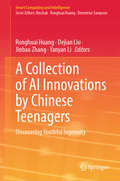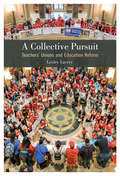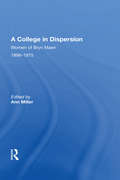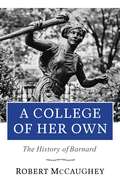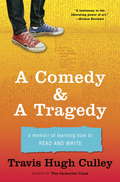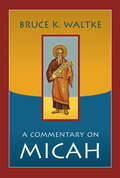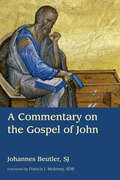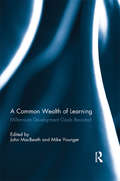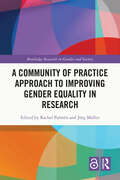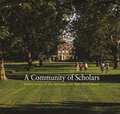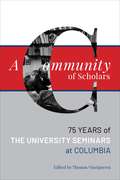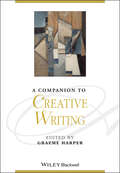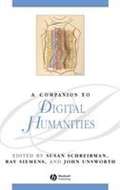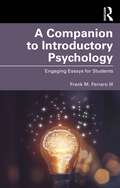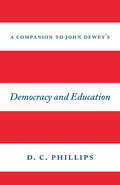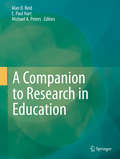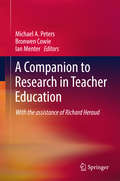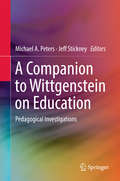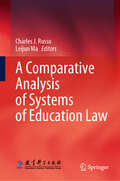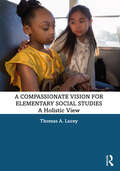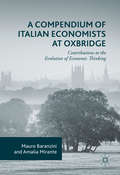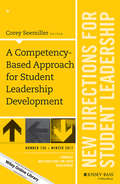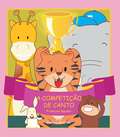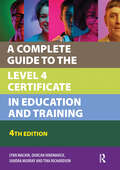- Table View
- List View
A Collection of AI Innovations by Chinese Teenagers: Discovering Youthful Ingenuity (Smart Computing and Intelligence)
by Yanyan Li Ronghuai Huang Jinbao Zhang Dejian LiuThis book presents 10 artificial intelligence (AI) innovation projects by Chinese teenagers, including innovations on intelligent medical care, environmental protection, education, transportation, among others. It delves into the technical details of these innovations, providing readers with a comprehensive understanding of the concepts and technologies involved in each case. The book also discusses the challenges faced by young innovators and their approaches to overcome them, and serves as a valuable resource for readers interested in the practical applications of AI.
A Collective Pursuit: Teachers' Unions and Education Reform
by Lesley LaveryTeachers’ unions are the organizations responsible for safeguarding the conditions of teachers’ employment. Union supporters claim strong synergies between teachers’ interests and students’ interests, but critics of unions insist that the stance of teachers in collective bargaining may disadvantage students as unions reduce the power of administrators to manage, remove, reward or retain excellent teachers. In A Collective Pursuit, Lesley Laveryunpacks how teachers’ unions today are fighting for contracts that allow them to earn a decent living and build “schools all students deserve.” She explains the form and function of the nation’s largest teachers’ unions. Lavery then explores unionization campaigns in the Twin Cities charter schools. A Collective Pursuit also examines teacher strikes and contract negotiations, school finance and finance reform, and district and union attempts to address racial achievement gaps, to provide a context for understanding the economic, political, and demographic forces that inspire teachers to improve conditions for students. A Collective Pursuit emphasizes that while teachers’ unions serve a traditional, economic role, they also provide a vast array of valuable services to students, educators, parents, and community members.
A College In Dispersion: Women of Bryn Mawr 1896-1975
by Ann MillerThis report, examining the lives of the women of Bryn Mawr, is designed to make the results of the 1970–1971 Bryn Mawr College Alumnae Survey accessible for general use. The survey reveals that there is a geographical clustering of graduates in the Eastern seaboard shelf.
A College of Her Own: The History of Barnard (Columbiana)
by Robert McCaugheyIn 1889, Annie Nathan Meyer, still in her early twenties, led the effort to start Barnard College after Columbia College refused to admit women. Named after a former Columbia president, Frederick Barnard, who had advocated for Columbia to become coeducational, Barnard, despite many ups and downs, became one of the leading women’s colleges in the United States.A College of Her Own offers a comprehensive and lively narrative of Barnard from its beginnings to the present day. Through the stories of presidents and leading figures as well as students and faculty, Robert McCaughey recounts Barnard’s history and how its development was shaped by its complicated relationship to Columbia University and its New York City location. McCaughey considers how the student composition of Barnard and its urban setting distinguished it from other Seven Sisters colleges, tracing debates around class, ethnicity, and admissions policies. Turning to the postwar era, A College of Her Own discusses how Barnard benefited from the boom in higher education after years of a precarious economic situation. Beyond the decisions made at the top, McCaughey examines the experience of Barnard students, including the tumult and aftereffects of 1968 and the impact of the feminist movement. The concluding section looks at present-day Barnard, the shifts in its student body, and its efforts to be a global institution. Informed by McCaughey’s five decades as a Barnard faculty member and administrator, A College of Her Own is a compelling history of a remarkable institution.
A Comedy & A Tragedy
by Travis Hugh CulleyIn this powerful memoir, former bicycle messenger and acclaimed author of The Immortal Class recounts his difficult journey to literacy. A Comedy & A Tragedy is the story of one young man's effort to teach himself to read. Complex and many-leveled, this book is also a manifesto about the acquisition of intellectual independence. It is a plea for better understanding of the impact of dysfunctional family dynamics in education, and a passionate indictment of a broken school system that lets so-called problem kids slip through the cracks.When Travis Hugh Culley moves with his family to Miami in the spring of 1980, the bright six-year-old hopes things will be easier for him. Instead, he is dubbed "Birdbrain" by his older brother and classified by his new teachers as a discipline problem. Travis fakes his way through tests and homework assignments, mimicking his fellow students and pretending to know how to read. When his music teacher suggests that he audition for an acting program, Travis begins an unlikely path toward literacy.The moment Travis begins to perform, he is confronted by his angry father, who is threatened by the transformation in his son. Unsure of how to make sense of what has happened, Travis grabs a pen and writes his experience down. Suddenly, everything can be seen in a new light. Having written, he begins to understand in a new way the relationship between words and actions.When his parents separate and his grades fall, Travis clings to a journal in which he notes the details of his changing life. Having no place else to turn to process his emotions, Travis lays claim to the project of his own emancipation. This troubled student runs away from home but does not drop out of school. With pen in hand, he commits to an education in the theater and begins to fully realize the power and importance of literacy. Travis discovers that only through the mastery of writing can he determine his place in the world. Eventually, he will become an accomplished author--with a triumphant story to tell. A Comedy & A Tragedy is an important and inspired memoir that will touch the hearts of parents, teachers, students, and anyone who has struggled with traumatic experiences in education. It is a work of love, of friendship, and of confidence in one young scholar's infinite belief in language.
A Commentary on Micah
by Bruce K. WaltkeIn this masterful commentary, respected biblical scholar Bruce Waltke carefully interprets the message of the prophet Micah, building a bridge between Micah's ancient world and our life today. Waltke's Commentary on Micah quickly distinguishes itself from other commentaries on this book by displaying an unprecedented exegetical thoroughness, an expert understanding of historical context, and a keen interest in illuminating the contribution of Micah to Christian theology. Tackling hard questions about date and authorship, Waltke contends that Micah himself wrote and edited the nineteen sermons comprising the book. Waltke's clear analytical outline leads readers through the three cycles of Micah, each beginning with an oracle of doom and ending with an oracle of hope, decisively showing that hope wins over doom. Learned yet amazingly accessible, combining scholarly erudition with passion for Micah's contemporary relevance, this book will well serve teachers, pastors, and students alike.
A Commentary on the Gospel of John
by Johannes BeutlerNew Testament scholar Johannes Beutler brings together a lifetime of study and reflection in this acclaimed commentary, first published in German in 2013 and now available to English-speaking audiences for the first time. Moving through the Gospel of John with a careful and critical eye, Beutler engages the relevant primary and secondary sources; summarizes the existing discussion; and presents syntactic, semantic, and pragmatic analyses of the text. As he meticulously examines the Fourth Gospel, Beutler pays special attention to the influence of Old Testament and Early Jewish traditions, to the overall structure of the Gospel of John, and to evidence suggesting a later stratum of contextualized "re-readings" in the composition of the Gospel. Bold, literary, and theological, this volume represents a landmark work of German biblical scholarship.
A Commentary on the Gospel of John
by Johannes BeutlerNew Testament scholar Johannes Beutler brings together a lifetime of study and reflection in this acclaimed commentary, first published in German in 2013 and now available to English-speaking audiences for the first time. Moving through the Gospel of John with a careful and critical eye, Beutler engages the relevant primary and secondary sources; summarizes the existing discussion; and presents syntactic, semantic, and pragmatic analyses of the text. As he meticulously examines the Fourth Gospel, Beutler pays special attention to the influence of Old Testament and Early Jewish traditions, to the overall structure of the Gospel of John, and to evidence suggesting a later stratum of contextualized "re-readings" in the composition of the Gospel. Bold, literary, and theological, this volume represents a landmark work of German biblical scholarship.
A Common Wealth of Learning: Millennium Development Goals Revisited
by John MacBeath Mike YoungerA Common Wealth of Learning takes a look at the millennium development goals that were set out at the start of the century. Utilising a far reaching set of case studies from a large percentage of commonwealth countries, this book looks at what the colonial legacy has left us with; and what we can do to progress. Chapters discuss; Partnerships for Leadership and Learning Quality Education and the Millennium Development Goals Revisited: Reflections, Reality and Future Directions. Assessing the Impact of Education Sector Policy Reform in Low-Income Countries: Developing a Comprehensive, Intervention-Focused Research Programme Education of Quality for All: Myth or Reality! Bridging the Gap Between Research, Policy and Practice in Africa Transformative Models of Practice and Professional Development of Teachers Partnerships for Leading and Learning: The Contribution of the Centre for Commonwealth Education This thoroughly researched and comprehensive text will be of great interest and use to anyone involved in education, higher education, education policy and research.
A Community of Practice Approach to Improving Gender Equality in Research (Routledge Research in Gender and Society)
by Jörg Müller Rachel PalménBringing together the latest research among various communities of practice (disciplinary and place based, as well as thematically organised), this volume reflects upon the knowledge, experience and practice gained through taking a unique community of practice approach to fostering gender equality in the sectors of research and innovation, and higher education in Europe and beyond. Based on research funded by the European Union, it considers how inter-organisational collaboration can foster change for gender equality through sharing of experiences of Gender Equality Plan implementation and examining the role of measures such as change-monitoring systems. As such, it will appeal to social scientists with interests in organisational change, the sociology of work and gender equality.
A Community of Scholars: Impressions of the Institute for Advanced Study
by Institute For Advanced StudyThe Institute for Advanced Study in essays and photosThis beautifully illustrated anthology celebrates eighty years of history and intellectual inquiry at the Institute for Advanced Study, one of the world's leading centers for theoretical research. Featuring essays by current and former faculty and members along with photographs by Serge J-F. Levy, the book captures the spirit of curiosity, freedom, and comradeship that is a hallmark of this unique community of scholars.Founded in 1930 in Princeton, New Jersey, the institute encourages and supports fundamental research in the sciences and humanities—the original, often speculative thinking that can transform how we understand our world. Albert Einstein was among the first in a long line of brilliant thinkers to be affiliated with the institute. They include Kurt Gödel, George Kennan, J. Robert Oppenheimer, Erwin Panofsky, Homer A. Thompson, John von Neumann, and Hermann Weyl. This volume offers an intimate portrait in words and images of a storied institution that might best be described as a true academic village. The personal reflections collected here—written by leading figures from across the disciplines—bring this exceptional academic institution and its history vibrantly to life.The contributors to this anthology are Michael Atiyah, Chantal David, Freeman Dyson, Jane F. Fulcher, Peter Goddard, Barbara Kowalzig, Wolf Lepenies, Paul Moravec, Joan Wallach Scott, and David H. Weinberg.
A Community of Scholars: Seventy-Five Years of The University Seminars at Columbia (Columbiana)
by Thomas VinciguerraThe Columbia University Seminars, founded in 1945, represent a distinctive experiment in academia. Scholars from different disciplines and institutions, as well as practitioners and other experts, meet once a month through the academic year to study and discuss subjects, sometimes beyond their specialties. Through collegial discussion, participants learn from one another. Today, over ninety seminars are ongoing: some have outlived their founders, while others are just beginning.A Community of Scholars is a seventy-fifth anniversary celebration of the founding of The University Seminars. It brings together essays by seminar chairs and other leading participants that exemplify the diversity and vibrancy of these proceedings. Their topics are wide-ranging—the evolution of the labor movement, urban life, the politics and culture of Brazil, the Enlightenment, the prospects for world peace—but in each, a commitment to intellectual provocation and shared learning is on full display. An informative introduction explains how The Seminars came into being and why they continue to matter. The volume also features biographical sketches of Frank Tannenbaum, the Latin America scholar and criminologist who founded The Seminars, and his wife, the anthropologist Jane Belo, a close friend of Margaret Mead. Belo and Tannenbaum endowed The Seminars and allowed them to flourish. A remarkable testament to an unparalleled intellectual forum, A Community of Scholars allows readers to share in the eclectic spirit of The Seminars.
A Companion to Creative Writing
by Graeme HarperA Companion to Creative Writing comprehensively considers key aspects of the practice, profession and culture of creative writing in the contemporary world. The most comprehensive collection specifically relating to the practices and cultural and professional place of creative writingCovers not only the "how" of creative writing, but many more topics in and around the profession and cultural practices surrounding creative writingFeatures contributions from international writers, editors, publishers, critics, translators, specialists in public art and moreCovers the writing of poetry, fiction, new media, plays, films, radio works, and other literary genres and formsExplores creative writing's engagement with culture, language, spirituality, politics, education, and heritage
A Companion to Digital Humanities
by Susan Schreibman Ray Siemens John UnsworthThis Companion offers overview of the emerging field of humanities computing. Major sections focus on the experience of particular disciplines in applying computational methods to research problems; the basic principles of humanities computing and archiving.
A Companion to Introductory Psychology: Engaging Essays for Students
by Frank M. Ferraro IIIA Companion to Introductory Psychology is a rich collection of thought-provoking chapters, which enhance student interest and promote group discussions, training entry-level students in critical thinking skills and engaging them with course material.Organized into five key sections—Biological, Cognition, Developmental, Social and Personality, and Mental and Physical Health—each features contemporary chapters accompanied by insightful discussion questions, further resources, and activities to encourage reflection by the reader and to promote group debate in a classroom context. These prompt readers to reflect deeply, to evaluate long-held beliefs and/or personal biases, and to assess controversial topics by analyzing them through a psychological lens.Mapped to the American Psychological Association Pillar model, this book will benefit a wide variety of audiences ranging from high school to college undergraduates. Primarily useful for courses in introductory psychology, this book is also practical for courses in behavioral neuroscience, cognitive psychology, developmental psychology, social psychology, health psychology, and abnormal and clinical psychology.
A Companion to John Dewey's Democracy and Education
by D.C. PhillipsThis year marks the centenary publication of John Dewey’s magnum opus, Democracy and Education. Despite its profound importance as a foundational text in education, it is notoriously difficult and—dare we say it—a little dry. In this charming and often funny companion, noted philosopher of education D. C. Phillips goes chapter by chapter to bring Dewey to a twenty-first-century audience. Drawing on over fifty years of thinking about this book—and on his own experiences as an educator—he lends it renewed clarity and a personal touch that proves its lasting importance. Phillips bridges several critical pitfalls of Democracy and Education that often prevent contemporary readers from fully understanding it. Where Dewey sorely needs a detailed example to illustrate a point—and the times are many—Phillips steps in, presenting cases from his own classroom experiences. Where Dewey casually refers to the works of people like Hegel, Herbart, and Locke—common knowledge, apparently, in 1916—Phillips fills in the necessary background. And where Dewey gets convoluted or is even flat-out wrong, Phillips does what few other scholars would do: he takes Dewey to task. The result is a lively accompaniment that helps us celebrate and be enriched by some of the most important ideas ever offered in education.
A Companion to Research in Education
by Michael A. Peters Alan D. Reid E. Paul HartThis volume offers a unique commentary on the diverse ways that educational inquiry is conceived, designed and critiqued. An international team of scholars examines cross-cutting themes of how research in education is conceptualised, characterised, contextualised, legitimated and represented. Contributions include specially commissioned essays, critical commentaries, vignettes, dialogues and cases. Each section discusses the significance of a complex terrain of ideas and critiques that can inform thinking and practice in educational research. The result is a thorough and accessible volume that offers fresh insights into the perspectives and challenges that shape diverse genres of research in education.
A Companion to Research in Teacher Education
by Ian Menter Michael A. Peters Bronwen CowieThis state-of-the-art Companion assembles and assesses the extant research available on teacher education and provides clear guidelines on future directions. It addresses an important need in a collection that will be of value for teachers, teacher educators, policymakers and politicians. There has been little sustained, long-term or systematic research to provide empirical support for the broad aspects of teacher education policy, largely because such research has been chronically underfunded and based on traditional practitioner knowledge. Many of the changes to teacher education are contentious and yet are occurring in rapid succession. These policies and movements have important consequences for education, teacher quality and the future of the teaching profession. At the same time, the policies and initiatives that support these changes seem to be based more on ideology, business interests and tradition than on research and empirical findings. The nature, quality and effectiveness of teacher preparation have increasingly become a central focus for education policy worldwide in a fiercely argued debate among governments, think-tanks, world policy agencies, education researchers and teacher organisations.
A Companion to Wittgenstein on Education: Pedagogical Investigations
by Michael A. Peters Jeff StickneyThis book, bringing together contributions by forty-five authors from fourteen countries, represents mostly new material from both emerging and seasoned scholars in the field of philosophy of education. Topics range widely both within and across the four parts of the book: Wittgenstein's biography and style as an educator and philosopher, illustrating the pedagogical dimensions of his early and late philosophy; Wittgenstein's thought and methods in relation to other philosophers such as Cavell, Dewey, Foucault, Hegel and the Buddha; contrasting investigations of training in relation to initiation into forms of life, emotions, mathematics and the arts (dance, poetry, film, and drama), including questions from theory of mind (nativism vs. initiation into social practices), neuroscience, primate studies, constructivism and relativity; and the role of Wittgenstein's philosophy in religious studies and moral philosophy, as well as their profound impact on his own life. This collection explores Wittgenstein not so much as a philosopher who provides a method for teaching or analyzing educational concepts but rather as one who approaches philosophical questions from a pedagogical point of view. Wittgenstein's philosophy is essentially pedagogical: he provides pictures, drawings, analogies, similes, jokes, equations, dialogues with himself, questions and wrong answers, experiments and so on, as a means of shifting our thinking, or of helping us escape the pictures that hold us captive.
A Comparative Analysis of Systems of Education Law
by Charles J. Russo Leijun MaThis book focuses on enhanced educator awareness of issues involving the status of the right to education as guaranteed by various legal systems throughout the world, in light of the growing interest in comparative and international studies, including the law. Consequently, this interdisciplinary, comparative book, which includes original chapters by leading academicians with expertise in law and education, is designed to serve as a resource for researchers in education and law as well as policymakers and students. To this end, the book provides readers with an enhanced awareness of the nature of legal systems impacting education throughout the world. Education is the driving force of the world development as well as the basic way to realize human rights and values. At the same time, law plays an important role in the protection, evaluation, guidance, and promotion in the process of the development of education. The book thus has interdisciplinary appeal. Various audiences will find this highly accessible book informative and valuable, including scholars with an interest in Education Law, university faculty and classes (whether involved in teacher preparation or educational leadership), legal practitioners, and university libraries.
A Compassionate Vision for Elementary Social Studies: A Holistic View
by Thomas A. LuceyThis text offers readers a holistic view of elementary social studies that instills compassion for all classroom voices and for those outside the classroom. This approach provides a social studies perspective that enables readers to articulate, apply, and defend engaging learning experiences that value each student. A revision of the original textbook by John Hoge and contributions by Laura E. Pinto, the work presents a comprehensive view of social studies that encourages reader awareness of and appreciation for their emotional and social identities. By being comfortable with themselves and their biases, readers may better appreciate the different perspectives of social studies content and better facilitating learning experiences that value the voices of all students.
A Compendium of Italian Economists at Oxbridge: Contributions to the Evolution of Economic Thinking
by Mauro Baranzini Amalia MiranteThisstudy examines five decades of Italian economists who studied or researched atthe Universities of Oxford and Cambridge between the years 1950 and 2000. Providing a detailed list of Italian economists associated with Hicks, Harrod,Bacharach, Flemming, Mirrlees, Sen and other distinguished dons, the authorsexamine eleven research lines, including the Sraffa and the neo-Ricardianschool, the post-Keynesian school and the Stone's and Goodwin's schools. Baranzini and Mirante trace the influence of the schools in terms of 1) theirfundamental role in the evolution of economic thought; 2) their promotion offour key controversies (on the measurement of technical progress, on capitaltheory, on income distribution and on the inter-generational transmission ofwealth); 3) the counter-flow of Oxbridge scholars to academia in Italy, and 4)the invigoration of a third generation of Italian economists researching orteaching at Oxbridge today. A must-read for all those interested in the way Italian and British research has shaped the study and teaching of economics.
A Competency-Based Approach for Student Leadership Development: New Directions for Student Leadership, Number 156 (J-B SL Single Issue Student Leadership)
by Corey SeemillerLooking to foster student leadership competency development? With this volume, you'll gain the latest research, resources, and tools to do just that. There are many factors to consider when providing educational experiences that foster student leadership competency development. But, the process of designing, facilitating, and assessing these experiences to be both effective and meaningful can be elusive and challenging. In this volume, a variety of scholars offer diverse perspectives and nuanced expertise that address the following questions: What leadership competencies are the most critical for students to develop? How can we ensure students are ready to develop leadership competencies? What instructional strategies and program design elements can we use to effectively enhance leadership competency development? How do we help students and educators track and measure leadership competency learning and growth? The Jossey-Bass quarterly report series New Directions for Student Leadership explores leadership concepts and pedagogical topics of interest to high school and college leadership educators. Issues are grounded in scholarship and feature practical applications and best practices in youth and adult leadership education.
A Competição de Canto
by Karla Marques V. Francois KeyserNeste livro da série "Os Junglies", os amigos descobrem que haverá uma competição de canto. Todos querem competir separadamente para ganhar o primeiro lugar, mas logo percebem que a combinação de seus talentos pode ser uma ideia melhor. Será que eles vão ganhar o concurso? Jovens leitores podem aprender a trabalhar em equipe com esta história na série "Os Junglies". Somos todos bons em algumas coisas, mas, às vezes, podemos conquistar muito mais quando combinamos os nossos talentos e trabalhamos juntos.
A Complete Guide to the Level 4 Certificate in Education and Training (Further Education)
by Duncan Hindmarch Lynn Machin Sandra Murray Tina RichardsonA complete and updated all-in-one guide to the Level 4 Certificate in Education and Training, suitable for use with any awarding organisation.This fourth edition of the bestselling text for all those working towards the Level 4 Certificate in Education and Training has been fully updated and tailored to meet the refreshed ETF Standards. It therefore provides an increased focus on subject pedagogy and covers information relating to a range of new and contemporary issues. It incorporates key information on reflective practice and study skills, and provides full coverage of all the mandatory units. Accessible language is combined with a critical approach that clearly relates practical examples to the required underpinning theory. Specifically, this fourth edition: takes into account the new Minimum Core incorporates Digital Skills and the ETF EdTech Strategy includes a new end of chapter feature to develop evidence-informed practice recognises the need to provide better support and guidance to learners around gender, sexuality, racism, mental health and well-being supports the revolution in online practices and implications for hybrid working and learning reflects the escalating importance of the sustainability agenda is suitable for use with all awarding organisations and HEIs provides the depth and criticality to meet level 4 requirements. User friendly, easy to read and covered a good range of material with good examples and case studies. Kerry Adam South Staffordshire College.The study skills section is very good - it picks up on the main issues facing trainees in Education and Training contexts and ensures that the advice and guidance are directly relevant to these learners. Also good are the sections on teaching observations and progression. Paul G Daniels Dearne College.I will be recommending it for its simplicity as a core text for our new ITT introductory programme. Christian Beighton Canterbury Christchurch.
